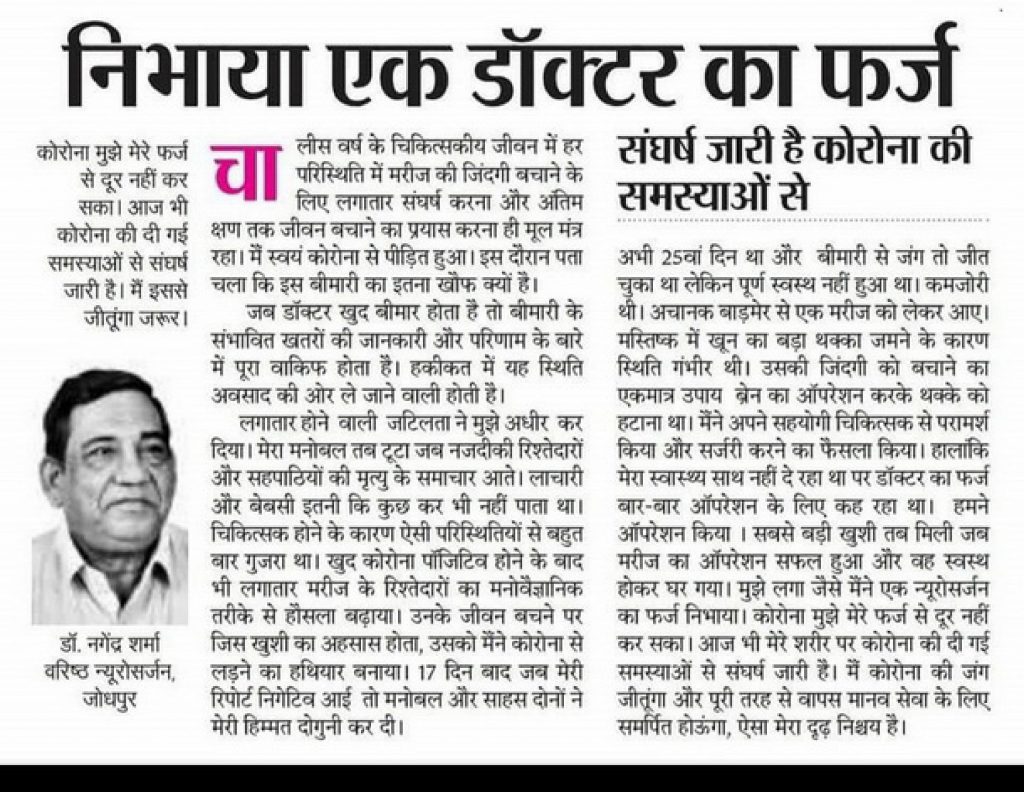Dr. Nagendra Sharma: Best Neurosurgeon in Jodhpur

Passionate, Professional, Qualified
Dr. Nagendra Sharma
M.S. (Gen Surg.), M.Ch. (Neurosurg.)
Neurosurgeon
- Seizure & Epilepsy
- Stroke
- Brain Hemorrhage
- Migraine & Headache Disorders
Dr. Nagendra Sharma is a very experienced Best Neurosurgeon in Rajasthan who has done many neuro cases with successful results.
Epilepsy is a chronic disorder that causes unprovoked, recurrent seizures. A seizure is a sudden rush of electrical activity in the brain. There are two main types of seizures. Generalized seizures affect the whole brain. Focal, or partial seizures, affect just one part of the brain. A mild seizure may be difficult to recognize. It can last a few seconds during which you lack awareness. Stronger seizures can cause spasms and uncontrollable muscle twitches, and can last a few seconds to several minutes. During a stronger seizure, some people become confused or lose consciousness. Afterward you may have no memory of it happening.
There are several reasons you might have a seizure. These include:
- High Fever
- Head Trauma
- Very Low Blood Sugar
- Alcohol Withdrawal
Epilepsy is a fairly common neurological disorder that affects 65 million people around the world. In the United States, it affects about 3 million people. Anyone can develop epilepsy, but it’s more common in young children and older adults. It occurs slightly more in males than in females. There’s no cure for epilepsy, but the disorder can be managed with medications and other strategies.
Because epilepsy is caused by abnormal activity in the brain, seizures can affect any process your brain coordinates. Seizure signs and symptoms may include:
- Temporary confusion
- A staring spell
- Stiff muscles
- Uncontrollable jerking movements of the arms and legs
- Loss of consciousness or awareness
- Psychological symptoms such as fear, anxiety or deja vu
Symptoms vary depending on the type of seizure. In most cases, a person with epilepsy will tend to have the same type of seizure each time, so the symptoms will be similar from episode to episode. Doctors generally classify seizures as either focal or generalized, based on how and where the abnormal brain activity begins.
Focal seizures
When seizures appear to result from abnormal activity in just one area of your brain, they’re called focal seizures. These seizures fall into two categories:
- Focal seizures without loss of consciousness: Once called simple partial seizures, these seizures don’t cause a loss of consciousness. They may alter emotions or change the way things look, smell, feel, taste or sound. Some people experience deja vu. This type of seizure may also result in involuntary jerking of one body part, such as an arm or leg, and spontaneous sensory symptoms such as tingling, dizziness and flashing lights.
- Focal seizures with impaired awareness: Once called complex partial seizures, these seizures involve a change or loss of consciousness or awareness. This type of seizure may seem like being in a dream. During a focal seizure with impaired awareness, you may stare into space and not respond normally to your environment or perform repetitive movements, such as hand rubbing, chewing, swallowing or walking in circles.
Symptoms of focal seizures may be confused with other neurological disorders, such as migraine, narcolepsy or mental illness. A thorough examination and testing are needed to distinguish epilepsy from other disorders.
Generalized seizures
Seizures that appear to involve all areas of the brain are called generalized seizures. Six types of generalized seizures exist.
- Absence seizures: Absence seizures, previously known as petit mal seizures, typically occur in children. They’re characterized by staring into space with or without subtle body movements such as eye blinking or lip smacking and only last between 5-10 seconds. These seizures may occur in clusters, happening as often as 100 times per day, and cause a brief loss of awareness.
- Tonic seizures: Tonic seizures cause stiff muscles and may affect consciousness. These seizures usually affect muscles in your back, arms and legs and may cause you to fall to the ground.
- Atonic seizures: Atonic seizures, also known as drop seizures, cause a loss of muscle control. Since this most often affects the legs, it often causes you to suddenly collapse or fall down.
- Clonic seizures: Clonic seizures are associated with repeated or rhythmic, jerking muscle movements. These seizures usually affect the neck, face and arms.
- Myoclonic seizures: Myoclonic seizures usually appear as sudden brief jerks or twitches and usually affect the upper body, arms and legs.
- Tonic-clonic seizures: Tonic-clonic seizures, previously known as grand mal seizures, are the most dramatic type of epileptic seizure. They can cause an abrupt loss of consciousness and body stiffening, twitching and shaking. They sometimes cause loss of bladder control or biting your tongue.
When to see a doctor: Seek immediate medical help if any of the following occurs:
- The seizure lasts more than five minutes.
- Breathing or consciousness doesn’t return after the seizure stops.
- A second seizure follows immediately.
- You have a high fever.
- You’re pregnant.
- You have diabetes.
- You’ve injured yourself during the seizure.
- You continue to have seizures even though you’ve been taking anti-seizure medication.
There’s no cure for epilepsy, but early treatment can make a big difference. Uncontrolled or prolonged seizures can lead to brain damage. Epilepsy also raises the risk of sudden unexplained death. The condition can be successfully managed. Seizures can generally be controlled with medication. Two types of brain surgery can cut down on or eliminate seizures. One type, called resection, involves removing the part of the brain where seizures originate. When the area of the brain responsible for seizures is too vital or large to remove, the surgeon can perform a disconnection. This involves interrupting the nerve pathway by making cuts in the brain. This keeps seizures from spreading to other parts of the brain. Recent research found that 81 percent of people with severe epilepsy were either completely or almost seizure-free six months after surgery. After 10 years, 72 percent were still completely or almost seizure-free. Dr. Nagendra Sharma is Best Neurosurgeon in Jodhpur with the best treatment & services. He is the Best Neurosurgeon in Jodhpur provides consultation & treatment in field of neurosurgery and related programs. Dozens of other avenues of research into the causes, treatment, and potential cures for epilepsy are ongoing. Although there’s no cure at this time, the right treatment can result in dramatic improvement in your condition and your quality of life.

